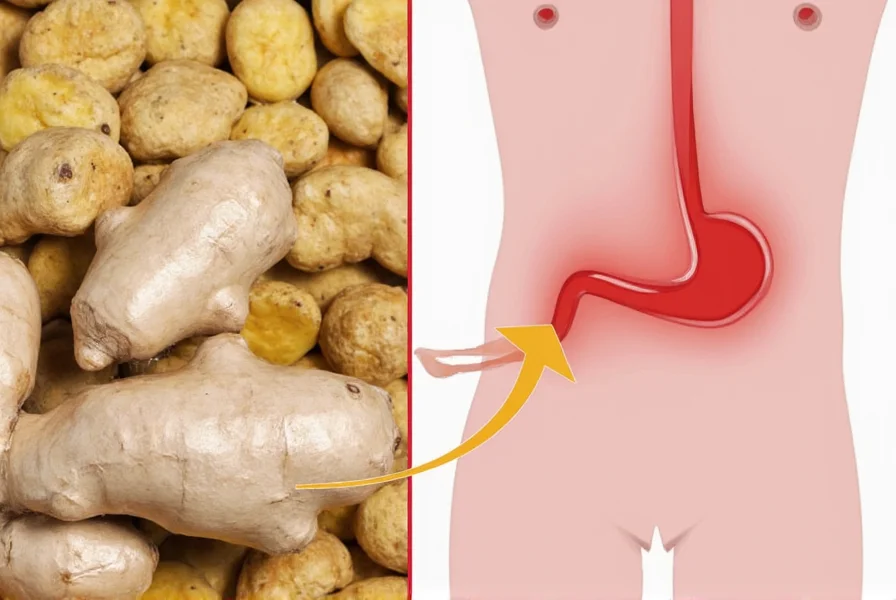Understanding Acid Reflux and Ginger's Role
Acid reflux occurs when stomach contents flow back into the esophagus, causing that familiar burning sensation known as heartburn. While occasional reflux is normal, frequent episodes may indicate gastroesophageal reflux disease (GERD). Many people seek natural remedies like ginger to manage symptoms without pharmaceutical interventions.
Scientific Evidence on Ginger and Digestive Health
Ginger (Zingiber officinale) contains bioactive compounds like gingerols and shogaols that have demonstrated anti-inflammatory and antioxidant effects in numerous studies. These properties may help reduce inflammation in the digestive tract and support proper gastric motility.
A 2021 review published in Nutrients examined ginger's effects on gastrointestinal disorders, noting its potential to accelerate gastric emptying and reduce nausea. Proper gastric emptying is crucial for preventing reflux, as delayed emptying increases pressure that can force stomach contents upward.
| Study | Findings on Ginger and Acid Reflux | Limitations |
|---|---|---|
| 2020 Clinical Trial (n=50) | Participants reported 32% reduction in reflux symptoms with 1.2g daily ginger extract | Small sample size; short duration (4 weeks) |
| 2019 Systematic Review | Ginger showed promise for functional dyspepsia, which often co-occurs with reflux | Not specific to GERD; limited human studies |
| 2018 Animal Study | Ginger reduced esophageal inflammation in reflux models | Animal model doesn't fully translate to humans |
How Ginger May Help Acid Reflux
Ginger appears to benefit digestive health through several mechanisms relevant to acid reflux:
- Accelerates gastric emptying - Reduces the time food spends in the stomach, decreasing pressure that causes reflux
- Anti-inflammatory properties - May soothe irritated esophageal tissue from acid exposure
- Antioxidant effects - Helps protect digestive tract lining from damage
- Reduces nausea - A common companion symptom to acid reflux
Potential Concerns: When Ginger Might Worsen Symptoms
Despite its potential benefits, ginger isn't universally helpful for acid reflux. Some individuals report worsened symptoms because:
- Ginger can stimulate gastric acid production in certain people
- Its spicy nature may irritate an already sensitive esophagus
- Large doses may increase stomach contractions that trigger reflux
- Raw ginger contains compounds that might relax the lower esophageal sphincter in susceptible individuals
Those with severe GERD, Barrett's esophagus, or who take blood thinners should consult their physician before using ginger regularly, as it may interact with certain medications.
Using Ginger Safely for Acid Reflux Relief
If you decide to try ginger for acid reflux, follow these evidence-based guidelines:
- Start with small amounts - Begin with 1/4 to 1/2 teaspoon of grated fresh ginger or 100-200mg of ginger extract
- Timing matters - Consume ginger 20-30 minutes before meals to support digestion rather than on an empty stomach
- Choose appropriate forms - Ginger tea, capsules, or cooked ginger may be gentler than raw ginger
- Monitor your response - Keep a symptom diary for 2 weeks to determine if ginger helps or worsens your condition
- Don't exceed recommended doses - Most studies use 1-1.5g daily; higher amounts increase risk of side effects
Ginger Compared to Other Acid Reflux Remedies
When considering natural remedies for acid reflux, ginger offers some advantages over other options:
- Unlike baking soda (which provides temporary relief but creates gas), ginger addresses underlying digestive function
- Compared to apple cider vinegar (which some use despite limited evidence), ginger has more research supporting digestive benefits
- Unlike licorice root (which can raise blood pressure), ginger has fewer significant side effects at appropriate doses
However, ginger shouldn't replace medical treatment for chronic GERD. It works best as part of a comprehensive approach that includes dietary modifications, weight management, and proper meal timing.
When to Consult a Healthcare Provider
While ginger may help with occasional acid reflux, consult a healthcare professional if you experience:
- Heartburn more than twice weekly
- Difficulty swallowing
- Unintentional weight loss
- Chest pain that radiates to your arm or jaw
- Symptoms that persist despite lifestyle changes and natural remedies
Chronic acid reflux requires proper medical evaluation to rule out serious conditions and determine appropriate treatment. Natural remedies like ginger should complement—not replace—professional medical care for persistent symptoms.

Practical Tips for Incorporating Ginger
For those wanting to try ginger for acid reflux relief, these practical approaches may help maximize benefits while minimizing potential irritation:
- Ginger tea preparation - Steep 1/2 teaspoon grated fresh ginger in 8oz hot water for 5-7 minutes; add honey if needed but avoid citrus
- Cooked applications - Add ginger to stir-fries, soups, or cooked vegetable dishes rather than consuming it raw
- Combination remedies - Try ginger with soothing ingredients like fennel or chamomile to reduce potential irritation
- Post-meal timing - For some, consuming ginger tea 30-60 minutes after eating provides benefits without triggering reflux










 浙公网安备
33010002000092号
浙公网安备
33010002000092号 浙B2-20120091-4
浙B2-20120091-4